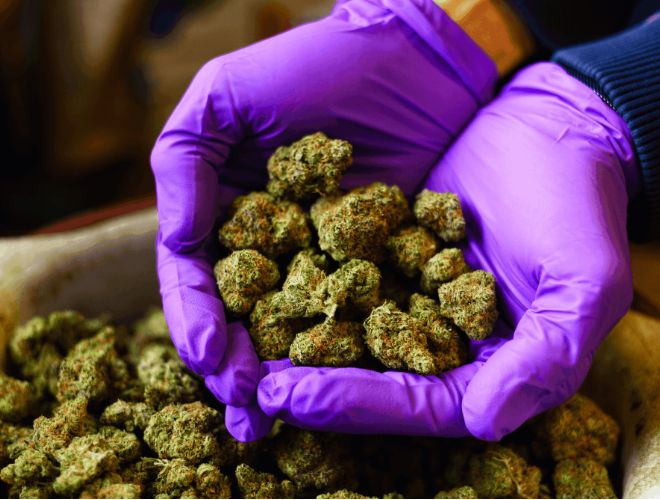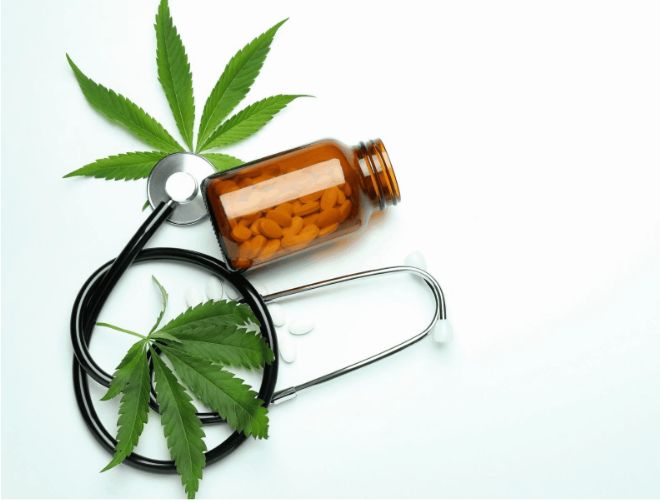Exploring The Top 3 Benefits Of THC For Sleep
Several studies suggest that improved sleep is one of the many benefits of medical marijuana.
These findings are supported by anecdotal evidence from many who use cannabis recreationally and for medical purposes.
However, the question many are asking themselves is; does medical weed contain tetrahydrocannabinol (THC)? And if it does, what happens when you sleep high?
Most people with insomnia or other sleep-related issues have tried or considered using marijuana for sleep.
However, many of those who haven’t don’t because of the other effects cannabis is known to induce.
One such effect is marijuana intoxication, popularly known as getting high.
Due to the many years of cannabis effects being portrayed in bad light, many may be cautious of trying it, even if they are aware of the potential benefits of medical marijuana.
However, this is slowly changing as the legal environment around cannabis and society’s attitude towards it shifts. Today, 38 states and the District of Columbia allow the medical use of cannabis.
In Utah, people with any of the 16 qualifying medical conditions can be approved and issued a medical marijuana card to purchase and consume marijuana in the state legally.
If you are wondering whether you qualify for a medical marijuana card in Utah, schedule an appointment with a qualified medical practitioner at the Green Team Doctors and get approved within minutes.
While poor sleep or even insomnia is not one of the qualifying conditions in Utah, researchers suggest it’s one of the potential medical benefits of marijuana.
Also, most of those conditions directly or indirectly affect how you sleep.
In this article, we take a look at what happens when you go to sleep high, whether cannabis improves sleep and other benefits of medical marijuana. Read on.

Does Medical Marijuana Contain THC?
The cannabis plant contains over 100 cannabinoids and thousands of other beneficial compounds, including terpenes and flavonoids. Of the 100-plus cannabinoids, two are credited with causing the most benefits of marijuana.
The two are tetrahydrocannabinol (THC) and cannabidiol (CBD). THC and CBD are thought to affect sleep individually and when combined in medical cannabis products.
THC is the primary cannabinoid in marijuana. It’s responsible for the psychoactive effects associated with the plant, as it’s the compound that gets you high.
CBD, on the other hand, is the most abundant non-psychoactive cannabinoid. It’s mostly used in its pure form in situations where the intoxicating effects of cannabinoids must be avoided.
The only cannabis-based prescription medicine approved by the FDA, Epidiolex, is made with cannabidiol only. It contains no tetrahydrocannabinol and, therefore, doesn’t cause euphoria-like experiences.
But do other medical marijuana products contain THC?
Some medical marijuana products contain whole plant extracts, including THC. As such, it’s best to assume that the products you purchase from a dispensary can get you high unless otherwise indicated.
However, this should not stop you from going ahead and getting the full benefits of medical marijuana. After all, THC, despite being the cause of the high associated with cannabis, is responsible for most of the plant’s potential medical benefits.
These include helping calm seizures, chronic pain, inflammation, mental disorders such as social anxiety, and even some sleep problems, especially those caused by conditions that cannabis may help manage.
If you are looking to enjoy the potential medical benefits of marijuana, you have to be issued a medical card after being evaluated by a qualified medical provider and diagnosed with a qualifying condition.
To know if you qualify for a medical cannabis card in Utah, book your appointment with a highly compassionate, qualified medical provider with the Green Team Doctors and get approved within minutes.

Medical Benefits of Marijuana: How THC Works for Sleep
Like most of its effects, the sleep-promoting effects of cannabis are believed to be a result of cannabinoids’ interactions with the receptors of the endocannabinoid system.
The endocannabinoid system (ECS) is a complex biological system that helps regulate and balance key bodily functions to maintain homeostasis, which is the state of internal stability while adjusting to varying external conditions.
Some functions regulated by the ECS include appetite, learning memory, metabolism, inflammatory and immune response, sleep, temperature control, and pain perception.
The ECS has cannabinoid receptors located all over the body. CB1 receptors are mainly located in the central nervous system, while CB2 are expressed primarily in the peripheral nervous system.
THC binds with both CB1 and CB2 receptors, although it has a very high binding affinity with the CB1 receptors, resulting in the psychoactive effects and medical benefits of marijuana.
By interacting with the cannabinoid receptors, THC may affect functions regulated by the ECS, including sleep, by promoting the release of adenosine and other sleep-promoting chemicals. It may also suppress brain arousal systems, leading to consumers feeling sleepy or sedated.
THC can also have a stimulating effect on some people, which may disrupt sleep, especially in higher doses. The reason for this is not apparent but is mainly attributed to the type of cannabis – Sativa or indica, and the influence of other compounds, such as terpenes.
But what are the benefits of medical marijuana for sleep?

Top 3 Medical Benefits of Marijuana for Sleep
1. It may help decrease sleep latency
How long does it take you to fall asleep after going to bed? The average healthy adult may take anywhere between 10 and 20 minutes to fall asleep after turning the lights off.
But if you find yourself counting sheep for longer than normal, medical cannabis may help. Most indica strains are known to provide relaxation and cause sleepiness which may help you fall asleep faster.
This is beneficial for patients who find it hard to fall asleep. However, a 2022 study on cannabis use in patients with insomnia and sleep disorders found that THC has a biphasic effect on sleep.
According to the study, THC can reduce sleep onset latency in low doses and is associated with greater ease of falling asleep. At higher doses, THC may reduce total rapid eye movement (REM) sleep.
2. May improve sleep quality for people with certain conditions
Mounting evidence suggests better sleep is one of the benefits of medical marijuana, especially for those with certain health conditions.
Lots of things can cause sleep problems. But if your insomnia results from a condition that cannabis may help improve, weed may be the answer you have been waiting for.
Several studies have found that cannabis may help improve sleep quality for people with conditions such as post-traumatic stress disorder (PTSD), MS, and chronic pain. The studies found that medical cannabis helped them fall asleep quicker, wake up less during the night, and have better rest.
Most qualifying conditions under the Utah Medical Cannabis Act cause poor sleep. If you are wondering if your condition qualifies for a medical marijuana card, book your appointment to consult one of the Green Team Doctors’ qualified medical providers in the state and get approved.
3. May improve sleep quantity
How long you sleep can be as important as how well you sleep. Luckily, research and anecdotal evidence suggest that sleep quantity is one of the potential benefits of medical marijuana.
In a 2022 study, researchers found a subjective improvement in patients’ quantity and quality of sleep after using cannabis for sleep, anxiety, and chronic pain. The study also noted that patients were able to discontinue prescription medications they previously took for sleep and anxiety.
While these benefits are encouraging, especially for those with sleep problems, more research is needed before medical cannabis can be approved as a treatment.

What Happens When You Sleep High?
When using cannabis to experience the benefits of medical marijuana, here’s what may happen when you get high before bed.
First, you may fall asleep faster than you usually do. Most cannabis strains, especially indica, are known to cause sedation, sleepiness, and relaxation, which may reduce your sleep latency which is the time taken to fall asleep.
However, that depends on the type of marijuana you take. Sativa strains promote wakefulness and may interfere with how long you take to fall asleep.
You may also experience a pretty dreamless night. This is because cannabis may also reduce rapid eye movement sleep (REM), the stage of sleep when dreaming, processing emotions, and cementing new memories happen.
While decreasing REM sleep may cause short-term memory or emotional problems, it may benefit people with PTSD who experience frequent nightmares. One study found that THC appears to eliminate nightmares and other post-traumatic symptoms in patients who have experienced them for long periods of time.
How much you consume also plays a role in what happens when you go to sleep high. If you take too much THC, you may experience paranoia and anxiety, making it harder to fall and stay asleep.
All in all, evidence shows that medical cannabis can improve sleep in people with insomnia. It may be worth looking into if you have a qualifying condition.
If you are looking to get a medical card in Utah, Green Team Doctor’s qualified medical practitioners are always available to get you approved in no time and answer all your questions and concerns about adopting medical marijuana.
Book your appointment to speak with a licensed Utah-qualified medical provider for your first in-person visit or telehealth renewal and embark on a new, all-natural healing journey today. You will only get charged for your consultation if you are approved.
